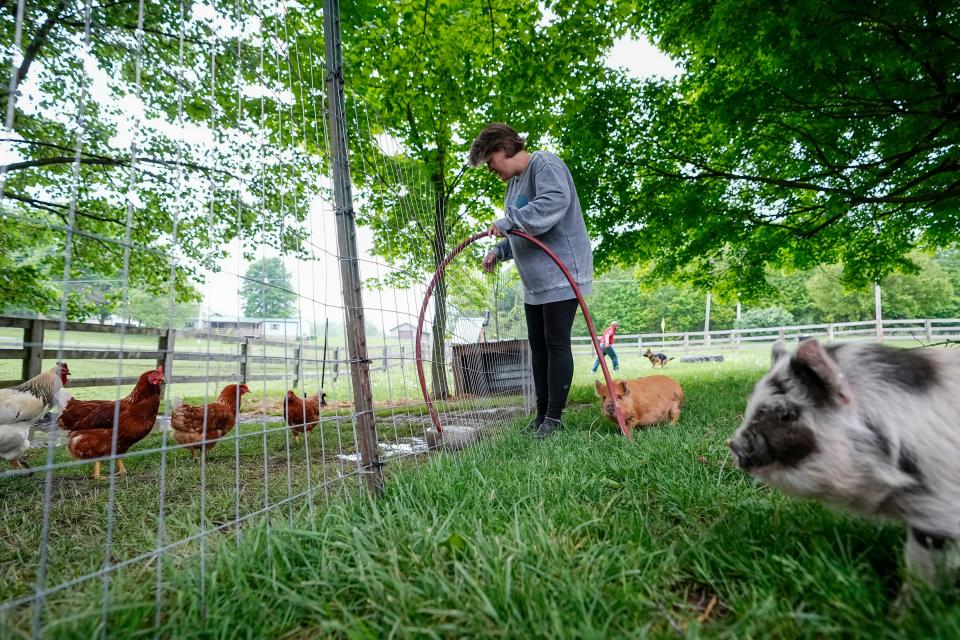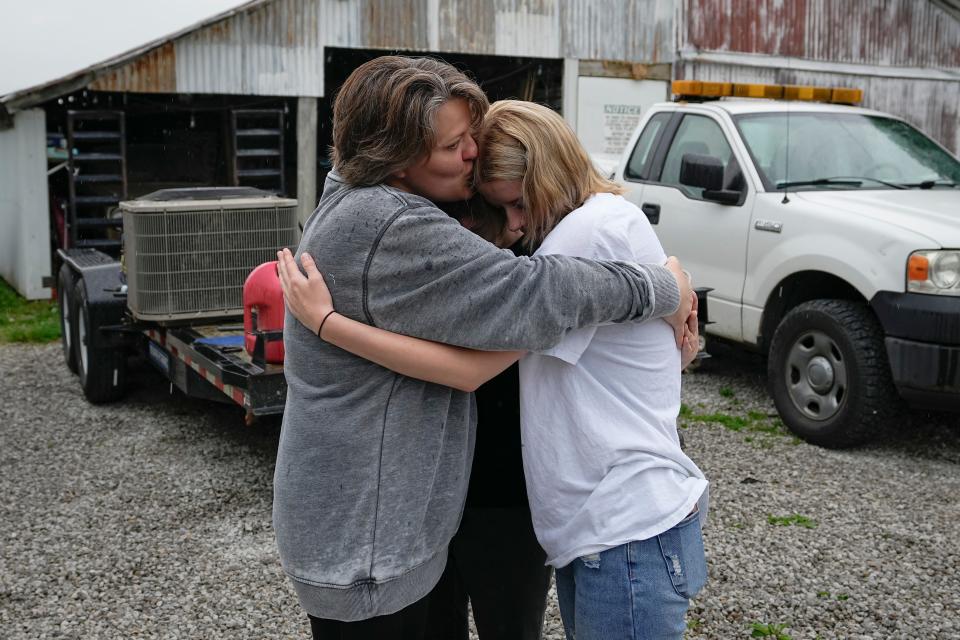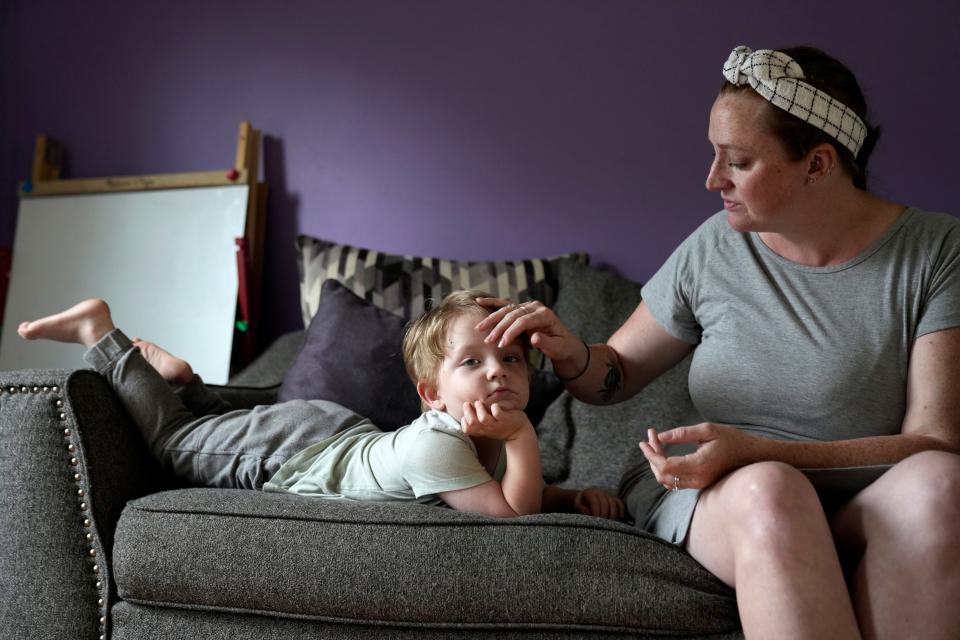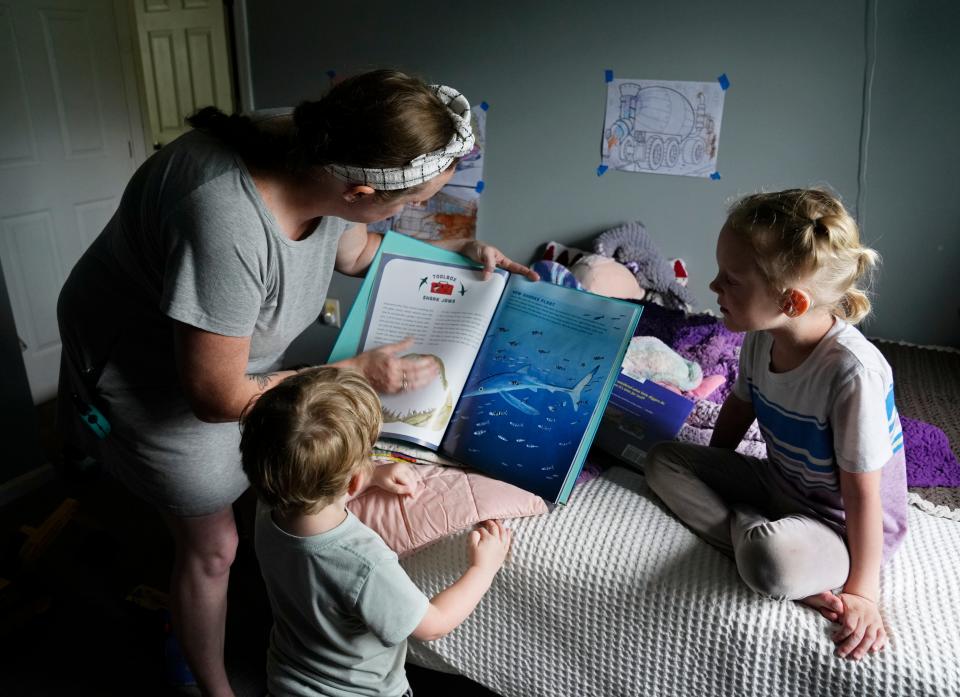'Time well spent': Ohio surrogates hope to spare heartbreak by carrying when others can't
Destiny Needles' favorite part of giving birth is that moment in the delivery room when a squalling, wriggling newborn is placed, for the first time, in the arms of their loving parents — even if she isn't one of them.
Over the past seven years, the 38-year-old Newark-area mother of three has given birth to two children as a gestational surrogate. Those two babies she carried are not biologically hers but belong to couples who have provided embryos to Needles via in vitro fertilization, or IVF.

The ability to carry a pregnancy to term is a "gift that I've been blessed with" said Needles, who is working with Compassionate Beginnings, an egg donor and surrogacy agency, to match with her third couple in search of a surrogate.
"I just feel like, OK, you have this blessing; you need to share this with your fellow woman because it's something that I can do," Needles said. "I'm just a firm believer that if you're capable of something, you should be doing it and sharing it with others."
Surrogacy is far from a new way of allowing those struggling with fertility to become pregnant, but the topic has gained more attention over the past few years. Celebrities have been candid about having children via surrogate, and a recent court ruling in Alabama to classify embryos as "children" has brought concerns over access to IVF and related services, such as surrogacy.
A rigorous process for hopeful parents and surrogates alike
But even as it inches more into the spotlight, there are still many misconceptions around surrogacy, Compassionate Beginnings founder Celia McNeil said. For example, some believe the woman providing the egg simply doesn't want to be pregnant.
"A lot of my intended parents have gone through anywhere between five to 10 years of infertility treatments trying to get pregnant on their own," McNeil said.
About one in four women between the ages of 15 and 49 in the United States either have difficulty getting pregnant or carrying a pregnancy to term, according to the Centers for Disease Control and Prevention.
That could be for a myriad of reasons, such as losing viable eggs due to medical treatments like chemotherapy, a scarred or misshaped uterus from recurrent miscarriages, a history of blood clots that could make pregnancy dangerous or being unable to get pregnant due to age.
"It's very rare that we see somebody just wanting to have somebody carry their baby because they don't feel like carrying," McNeil said, adding the process for parents can cost upwards of $120,000. Surrogates themselves can get around $40,000 or more.

LGBTQ+ couples comprising of partners who cannot physically carry a baby are also often among those seeking a surrogate.
Other misconceptions include that the father providing the sperm has to have sex with the surrogate or that the surrogate is likely to fight to keep the baby since it's biologically theirs.
Neither are true, McNeil said. Traditional surrogacy, when the surrogate is the egg donor as well as the carrier and makes the child also biologically the surrogate's, is not practiced in the state, as far as McNeil knows.
At Compassionate Beginnings, surrogates must undergo psychological evaluations and counseling to determine their motivations and overall mental wellness. They must also establish a relationship with the intended parents and sign a legal contract, covering basics like the baby being carried belongs to those intended parents; it could also include specifics about compensation, like for travel or medical appointments.
Em Hughes, a 31-year-old mother of two in Columbus also working with Compassionate Beginnings, is around 10 weeks pregnant as a surrogate. She likens her relationship with the growing baby to that of a loving aunt. Her body, she says, recognizes its not biologically hers, but love for it exists.

"I'm so excited for the baby to be here," Hughes said. "I'm so excited for the family to be allowed to hold the baby they've craved for years and years and years."
Surrogates are often in the same state as the prospective parents, but even when they're not, the relationships created often go well beyond surrogate and baby. They'll usually attend appointments together and stay in close contact through the nine months of pregnancy and ultimately are all together in the birthing suite on that anticipated day.
Surrogates are a 'unique' set of people
Needles became pregnant with her first biological child as a 14-year-old. Her initial exposure to surrogacy was sitting pregnant on her family's couch, crying about the mountain of unknowns that come with being a teenage mother. She found a maternity show on TV, featuring a woman struggling through miscarriage after miscarriage and decided to use a surrogate.
"I was like, 'Oh my God; here I am crying, when this is a blessing in my life, and I need to be thankful,'" Needles recalled "It doesn't change that I'm scared. I'm still terrified. But I was thinking like, 'Oh my gosh, I need to do this one day.'"

Hughes witnessed the heartbreak of infertility a little closer to home. One of her close friends and former college roommate suffered serious complications and several miscarriages while trying to get pregnant, and in a tearful conversation, Hughes offered to carry her baby and started researching surrogacy.
She didn't end up being a surrogate for her friend, who eventually had her own child, but the idea of gifting parenthood to those like her stuck with Hughes.
"I just had the thought that if I could spare a family the heartache and the trauma of what my roommate was going through, then it would be time well spent," Hughes said.

McNeil described the surrogates she works with as a "unique" and "service-oriented" set of people, but they can be hard to find, and demand for them is increasing.
"The surrogates that people want to work with are not searching the internet, you know, 'How much I get paid to be a surrogate?' or 'I want to be a surrogate,' so it's about trying to reach people who would qualify but have never thought of it themselves," McNeil said.
That, McNeil said, usually starts with a story that touches someone's heart.
More information on finding or becoming a surrogate can be found at compassionatebeginnings.com.
shendrickson@ dispatch.com
This article originally appeared on The Columbus Dispatch: Ohio surrogates hope to spare heartbreak by carrying when others can't

